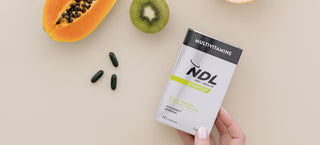As temperatures rise, many people look for the best vitamins for summer fatigue to help their bodies cope with the demanding conditions of this time of year.
Summer is often associated with holidays, outdoor activities, and more free time. However, it’s also common to feel more tired or low on energy during these months. Intense heat, increased sweating, changes in sleep and eating routines, and higher levels of physical activity can all contribute to a feeling of exhaustion that isn’t always resolved by simply getting more rest.
In many cases, this seasonal fatigue can be linked to mild nutritional deficiencies, especially of certain vitamins that are essential for energy metabolism. Maintaining adequate levels of these micronutrients is key to feeling vital and active—even on the hottest days of the year.
In this article, we’ll take a look at which vitamins can help you fight summer fatigue and how to incorporate them into your daily routine in a natural way.
Why do we feel more tired in summer?
Although summer encourages us to be more active, it can also take a toll on the body. High temperatures force the body to work harder to regulate internal temperature, which increases energy expenditure. We also sweat more, which can lead to a loss of electrolytes and water-soluble vitamins like vitamin C and several B vitamins.

In addition, routines change: we sleep worse due to nighttime heat, we spend more time in the sun, do more outdoor activities, and sometimes neglect our diet. All of this can result in a constant feeling of fatigue, trouble concentrating, or lack of motivation.
Identifying the causes of summer fatigue is the first step toward effectively addressing it. Nutrition plays a key role in that process. But which vitamins are best to fight fatigue in summer?
Key vitamins to fight summer fatigue
A diet rich in essential vitamins can make all the difference when it comes to maintaining energy levels during the summer. Here are the most important ones:
- Vitamin B12: essential for red blood cell formation and proper nervous system function. It also plays a role in energy metabolism, so deficiency can lead to weakness, fatigue, and poor concentration. Found naturally in meat, fish, eggs, dairy, and as supplements for people on vegan or vegetarian diets.
- Vitamin C: best known for supporting the immune system, it also helps reduce fatigue thanks to its antioxidant action. In addition, it enhances iron absorption—another key nutrient for energy. Found in citrus fruits, kiwi, strawberries, peppers, and broccoli.
- Vitamin D: although it’s synthesized through sun exposure, we don’t always reach sufficient levels—especially if we avoid peak sunlight or use strong sunscreen. Vitamin D influences mood and overall vitality. Sources include dairy, fatty fish, egg yolk, or supplements if needed.
- Vitamins B1, B6, and B9 (folic acid): these B-complex vitamins are involved in the metabolism of carbohydrates, proteins, and fats, turning them into usable energy. Low intake can increase fatigue. Found in whole grains, legumes, nuts, bananas, and spinach.
These vitamins play a crucial role in energy production and overall well-being, especially in summer when the body is under greater stress. Ensuring they’re present in your diet can help you keep going without being slowed down by fatigue.
Do I need supplements, or is food enough?
In most cases, a balanced and varied diet is enough to meet your daily vitamin needs. However, in summer, it can be harder to maintain that balance—due to reduced appetite, lighter meals, disrupted routines, or specific dietary restrictions.
Vitamin supplements can be a helpful temporary aid if there’s a diagnosed deficiency, if you follow a limited diet (such as a vegan diet without B12), or if you experience persistent fatigue despite eating well and getting enough rest.
It’s important not to self-medicate or take supplements indiscriminately. A healthcare professional can help assess whether you really need them and what dosage is appropriate, based on your habits, symptoms, and lab results.
Extra tips for staying energized in summer
In addition to getting the right vitamins, adopting healthy habits can help prevent seasonal fatigue and boost your vitality:
- Stay well hydrated: heat leads to dehydration, which can cause fatigue, headaches, and weakness. Drink water regularly—even when you're not thirsty—and consider electrolyte-rich drinks if you exercise or sweat a lot.
- Choose fresh, nutrient-dense foods: opt for seasonal fruits and vegetables, hearty salads, chilled legumes, and oily fish. These are easy to digest and rich in essential vitamins.
- Get proper sleep: try to stick to a regular sleep schedule, wear lightweight clothes, and keep your bedroom cool to rest better.
- Avoid intense exercise during peak heat: work out early in the morning or in the evening, and make sure to recover well afterward.
- Limit caffeine and alcohol: both can interfere with sleep and contribute to dehydration.
In conclusion, summer fatigue is common—but not unavoidable. Understanding how heat, routine changes, and diet affect your energy levels is key to preventing it.
Vitamins play a vital role in staying balanced during the summer months, and keeping adequate levels of B12, C, D, and other B vitamins can help you feel more energized and focused all season long.

From the NDL Pro-Health team we will provide you with tips to maintain a healthy lifestyle. Sharing knowledge and product recommendations to offer optimal solutions for your daily routine, for your workouts and subsequent recovery, all with the goal of helping you achieve physical and mental wellness.

















